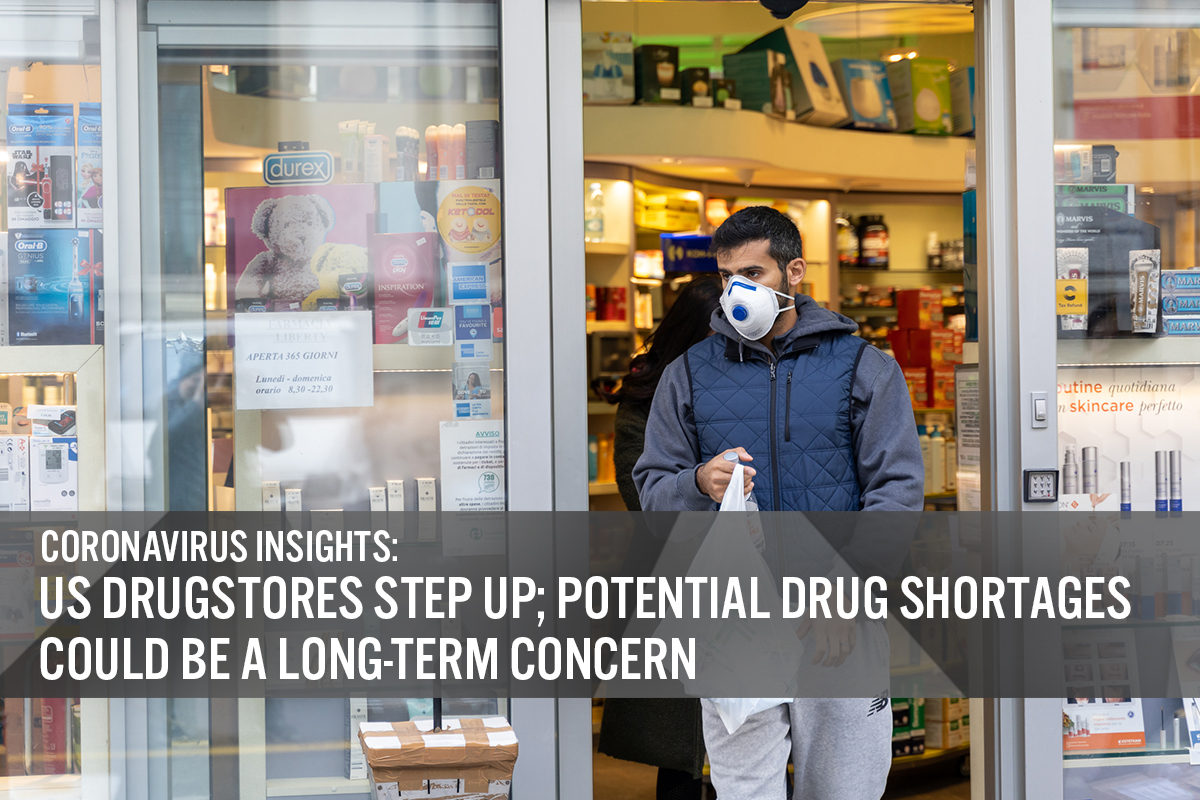
albert Chan
In our Coronavirus Insights series, we outline the possible impacts of the coronavirus outbreak on economies, sectors and businesses. In this report, we look at how major US drugstores—such as CVS, Rite Aid and Walgreens—are supporting consumers in response to the outbreak, as well as considering the potential for future drug shortages.
US Drugstores Support Consumers amid the Outbreak
As the coronavirus continues to spread widely in US, the nation’s two largest drugstore chains are playing an important role in making virus testing more accessible. CVS and Walgreens have rolled out new policies to relieve patients of the high medical costs for testing.
- For Aetna members, CVS has waived the co-pays for all coronavirus-related diagnostic testing and offered $0 co-pay telemedicine visits, which were made available in 40 states from March 6, 2020. The drugstore chain has also waived the fee for prescription delivery from March 9, 2020 to prevent patients travelling to physician offices and therefore minimize their risk of exposure to the coronavirus.
- Walgreens has also been offering free delivery on all eligible prescriptions since March 13, 2020. In addition, consumers in 14 US cities can order a wide range of health, wellness and other convenience products online for home delivery, which is fulfilled by Postmates courier services.
Both CVS and Walgreens announced on March 13 that they are working with Centers for Medicare & Medicaid Services and Centers for Disease Control and Prevention to facilitate frequent and efficient coronavirus testing. Testing services are being set up in designated areas of selected drugstore parking lots, so people will not have to leave their cars to be tested. With the companies’ massive store fleets—each has around 10,000 locations—people across the nation will be able to access testing services more easily.
The third-largest US retail pharmacy chain, Rite Aid, noted on March 16, 2020 that its drugstores are working with the government to offer drive-through testing and additional clinical services in some of its 2,400+ locations.
US drugstores have been facing fierce competition from mass retailers such as Target, Walmart and online pharmacies, but the coronavirus crisis could represent an opportunity for them to gain a competitive advantage. CVS and Walgreens have been two of the top destinations for people to bulk buy hygiene products and essentials in the past week. Both companies have implemented digital healthcare initiatives, including telehealth services. We expect to see a spike in the use of video doctor consultations during the coronavirus period, and this could become a more sustainable alternative to physical visits in the long term. By providing compelling offerings and support during this challenging time, CVS and Walgreens could increase their brand profile and attract new customers.
US Pharmaceutical Supply Shortages Could Be the Next Challenge
Besides shortages of hygiene products, another major concern for US drugstores is the potential drug shortage that will result from the nation’s heavy reliance on China in the drug manufacturing supply chain. The production of medicine usually requires several steps that can take place in different countries, and the manufacturing of active pharmaceutical ingredients (API) happens largely in China and India. According to the US Food and Drug Administration, 80% of API manufacturers are located outside of the US. The US has imported more than 90% of its antibiotics, vitamin C and ibuprofen in recent years, according to The Council on Foreign Relations.
The coronavirus is already disrupting the global supply chain in the retail industry, but drug shortages have not happened immediately. Although factories in China did partially or fully suspend operations when the coronavirus first broke, China’s Ministry of Industry and Information Technology stated on March 13, 2020 that 90% of large industrial businesses have already resumed work—that percentage drops to around 60% for small and medium-sized enterprises outside of Hubei province. Furthermore, as reported by The Guardian, most pharmacies keep at least one or two months’ worth of supplies on hand.
At the Barclays Global Healthcare Conference on March 12, 2020, CVS commented that it hasn’t experienced disruption in the supply of drugs so far, and that the drugstore chain’s suppliers usually carry three to six months of inventory on average. Similarly, during its investor day on March 16, 2020, Rite Aid noted that it sees little immediate risk as the company has sufficient supplies of generic drugs.
In the longer term, drug shortages could still be a concern in the US, as the outbreak continues to spread to other countries that are heavily involved in the supply chain of these products. For example, India placed limits on the exports of certain medicines on March 4, 2020.